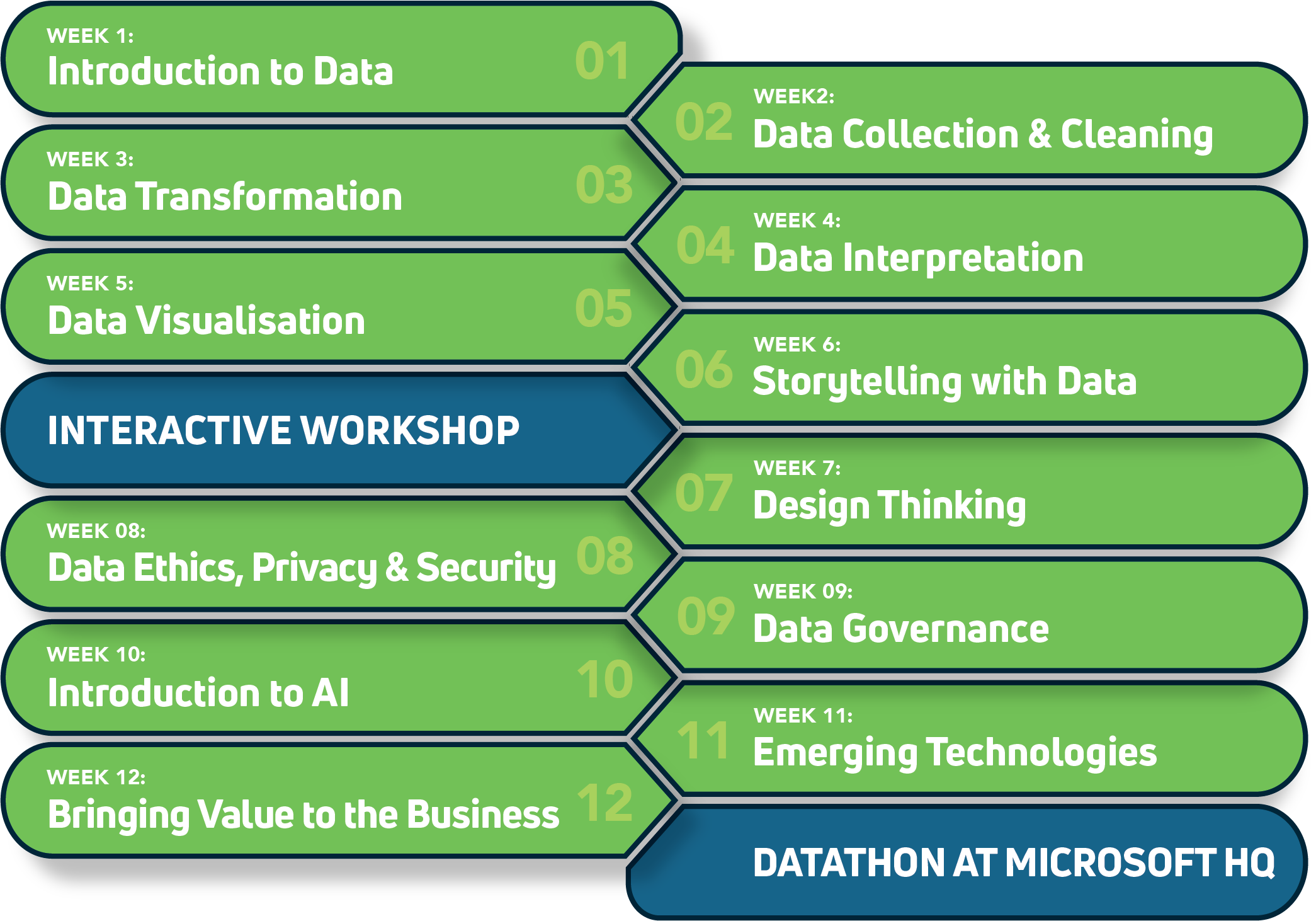DataSMART Programme
This flexible 12-week programme combines engaging online tutorials with hands-on, interactive workshops led by Global Industry Experts, equipping participants with the confidence and skills needed to analyse and apply data strategically and effectively. The programme also includes two interactive workshops, providing excellent networking opportunities.
Please visit the dedicated website here for additional information
Modules
The Programme includes 12x 1-hour long modules, 1x 2-hour long interactive workshop and a Datathon event in Microsoft.

Who's it for?
Ideal for non-IT professionals seeking to build confidence in using data, make informed decisions, or communicate more effectively in a data- rich environment. The DataSMART programme equips professionals with the foundational skills in data collection, cleaning, transformation, visualization, and storytelling, while exploring cutting- edge topics like AI, data governance, and emerging technologies.
Programme Benefits?
Participants will be equipped with the necessary skills to understand, interpret, and leverage data, enabling smarter, more informed decisions that drive success across all areas of their work.
The programme teaches participants how to streamline data management in their roles—from collection to presentation—helping them save time, reduce errors, and deliver high-quality results.
Future Proof Skills
Participants will stay ahead of the curve by gaining an understanding of emerging technologies such as AI and data governance, ensuring they remain relevant and adaptable in an increasingly data-driven world.
Strong Communication Skills
The programme provides participants with the ability to translate their work into clear, compelling visualisations and stories, making it easier to communicate insights and influence stakeholders.
Flexible Learning Experience
The programme is designed to fit busy schedules, ensuring participants can incorporate study into their daily lives.
Nurture a Data-Driven Culture
Teams are equipped with essential data skills to foster a data-driven mindset, encourage collaboration, inform decision-making, and build confidence in their ability to leverage data effectively and efficiently.
Improved Customer Insights
By enhancing the data literacy skills of the workforce, organisations are better positioned to understand and respond to customer and client needs, driving engagement and satisfaction.
Future-Ready Workforce
Organisations can prepare for the evolving digital landscape by ensuring their teams are equipped with the most up-to-date data skills, building resilience in the market.
Build Operational Efficiency
Data-driven insights are used to streamline processes, reduce costs, and improve overall operational efficiency, resulting in a more agile organisation.
Tailored Programme
Workshops can be customised to align with specific challenges and goals, ensuring a targeted and impactful learning experience that delivers immediate, real-world value.
Delivery
Running over the course of 12 weeks, the flexible learning will deliver 16 hours of engaging, skill-building content designed for non-IT professionals and those with key responsibilities who may find full-time study challenging.
The programme includes a combination of online tutorials and live workshops facilitated by Microsoft. Workshop recordings will be available on Digital Skillnet’s dedicated online learning platform after each session.
Upon successful completion, participants receive the DataSMART Foundation Certificate in Data Skills jointly awarded by The Analytics Institute and Microsoft.
Learn More:
Click the button below to visit the dedicated website to learn more about this initiative or contact us at [email protected] to find out more.
